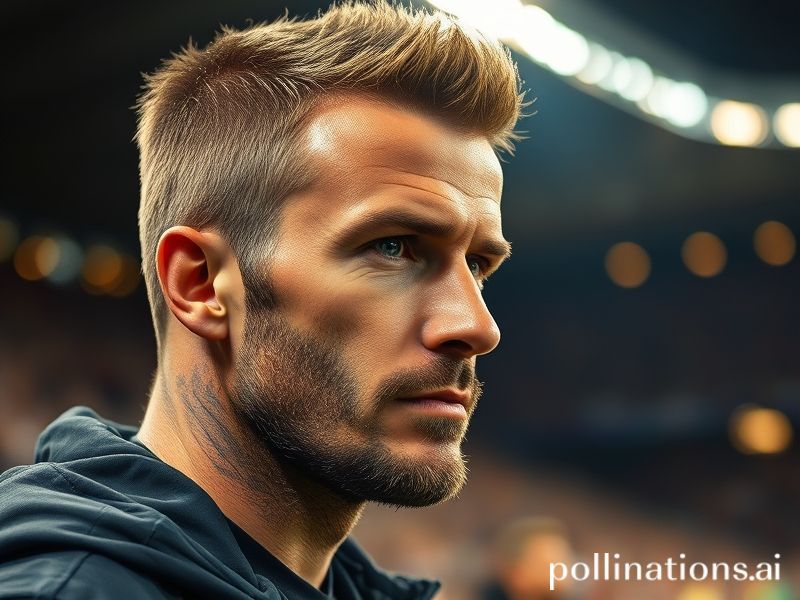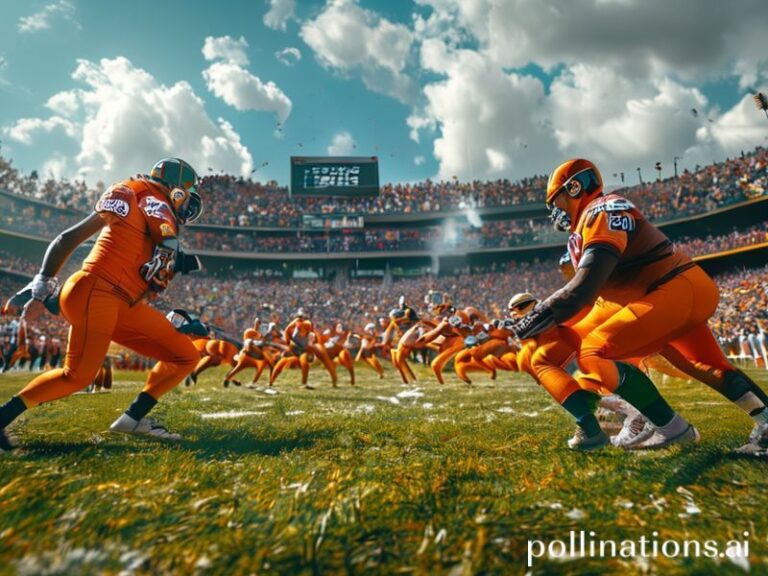Bend It Like Beckham, Brand It Like Globalization: The World According to DB7
When historians of late-capitalist decadence need a single face to explain how a Manchester United right-midfielder metastasized into a planetary lifestyle brand, they’ll probably pick David Beckham: the haircut that launched a thousand visa stamps. From a cramped East London terrace to the gilded benches of Qatar’s World Cup, Beckham has become the first footballer whose passport stamps outnumber his league titles. That, dear reader, is globalization in boots.
Start with the obvious: Beckham’s right foot was never just a limb; it was an export commodity. His free-kick against Greece in 2001 didn’t merely secure England a World Cup berth—it secured England a narrative, one that could be repackaged from Yokohama sports bars to Lagos street stalls selling knock-off No. 7 shirts stitched in the same Bangladeshi workshops that clothe half the planet. In Beckham’s arc, the ball bends geopolitically: wherever it lands, GDP trembles.
But the true alchemy began after the boots were hung up. Beckham pivoted from athlete to ambulatory hedge fund, converting the last fumes of sporting talent into a diversified portfolio of soft power. The beard went salt-and-pepper, the voice dropped an octave, and suddenly he was lecturing Southeast Asian children on malaria nets while wearing a $4,000 bomber jacket. UNICEF calls it “ambassadorship”; cynics call it the most effective halo-polish since the Pope started tweeting.
The irony thickens when you consider the countries eager to scrub their reputations with his stubble. Qatar paid him a reported £150 million to smile beside stadiums built by migrants whose passports were confiscated faster than you can say “cultural exchange.” Beckham’s defense—that sport “brings people together”—sounds less convincing once you realize the people it brought together were largely unpaid. Human-rights campaigners grumbled; Doha shrugged and adjusted the lighting on its Beckham billboard so his cheekbones caught the desert sunset just so.
Still, the man is no mere billboard. He is a walking trade agreement. When Beckham joined Paris Saint-Germain in 2013, the French press hailed the “Beckham effect,” a sudden spike in Qatari tourism and shirt sales that briefly eclipsed France’s GDP growth forecasts. One fashionably disheveled midfielder did what a dozen trade ministers could not: convince Gulf petrodollars to vacation where the wine is overpriced and the waiters are rude. Somewhere in Brussels, an EU bureaucrat deleted a PowerPoint.
Meanwhile, in the Americas, Major League Soccer’s entire business model pivoted on the gravitational pull of Brand Beckham. Inter Miami—co-owned, coiffed, and occasionally coached by the man himself—was allowed to exist because Beckham’s original 2007 LA Galaxy contract included a cut-price expansion clause. The clause was the soccer equivalent of finding a golden ticket in a Wonka bar, except instead of chocolate you get humid Florida evenings and the existential dread of watching your striker miss an open net. Investors lined up anyway; Beckham could sell sand to Saudi Arabia, let alone season tickets to Floridians.
And yet, for all the soft-focus documentaries and Instagram-filtered family portraits, the global Beckham empire runs on the same grimy machinery that powers any other multinational: supply chains, tax treaties, and the quiet knowledge that charisma scales better than ethics. His fragrances ship from a warehouse outside Rotterdam; his whiskey ages in Scottish casks owned by a Singaporean holding company; his image rights are domiciled in Luxembourg, where tax inspectors wave at the cameras with the enthusiasm of substitute goalkeepers in a penalty shootout.
In the end, Beckham’s legacy may be less about bending footballs than bending reality itself: persuading billions that a kid from Leytonstone could become the world’s most agreeable geopolitical lubricant. If that sounds dystopian, remember we live in an age when nations outsource diplomacy to influencers and wars are fought in comment sections. Beckham merely got there first, hair gelled and smile pre-approved by three separate PR agencies.
So raise a glass—preferably something amber, bottled in Speyside, taxed in Luxembourg—to the man who proved that fame is the only renewable resource we haven’t yet managed to squander. May his free-kicks stay looping in perpetual cultural orbit, a reminder that in the 21st century, even gravity signs endorsement deals.







